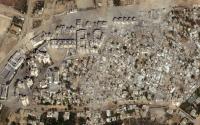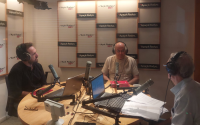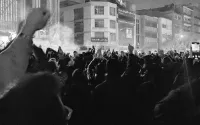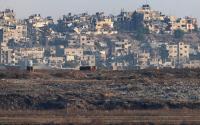By Kim Sengupta
Published: 07 May 2006
The shooting down of the British military helicopter in Basra yesterday and the violent rioting that followed were grim reminders of the fragility of the security situation in southern Iraq.
Although the region has escaped much of the daily mayhem of the Sunni areas of the country, the time has long gone since it was portrayed as a model of reconstruction. Once the British may have been out of this firing line and seen by the Shia population of the south as "liberators". Now the picture is very different.
The attack on the helicopter is a racheting up of the threat facing the UK forces. British commanders had drastically restricted movements by road after a series of deaths caused by sophisticated bombs allegedly supplied by Iran. Transport by air was adopted as a far safer option.
However, the large numbers of operations had left crews more vulnerable to attacks. Safety devices fitted to helicopters protected them from surface-to-air missiles - but not from rocket-propelled grenades.
There has been another reason for curtailing the number of ground convoys. Co-operation and joint patrols with the Iraqi police have dwindled to the extent that British soldiers no longer leave their heavily fortified bases unless absolutely necessary. The main aim now is to keep as low a profile as possible while preparing for the withdrawal of the bulk of the 8,000 plus British forces during the next 12 months.
Yesterday's scenes, of mobs throwing petrol bombs at Warrior armoured vehicles and chanting in support of radical Shia cleric Muqtada al-Sadr and his Mehdi Army, described by British army spokesman Major Sebastian Muntz as "horrible", were reminiscent of those last September when British forces clashed with Iraqi police while rescuing two special forces soldiers.
The fallout from that, with vociferous condemnations of Britain by Shia politicians and clerics, led by the governor Mohammed al-Walli, and further angry demonstrations, was startling evidence for people back in the UK that the honeymoon period was long over.
The violence was also graphic evidence of how the Iraqi police, trained and armed by British forces were now following their own, very different agenda.
The US and British-led coalition had invited Shia militias, mainly the Mehdi Army and its rivals in the Badr Brigade, to join the police. With little or no checks and controls, the groups had simply taken over police stations and began systematic sectarian campaigns against the remaining Sunnis in the region as well as Shias who did not follow their fundamentalist Islamist tenets.
The two seized British undercover soldiers were gathering intelligence on one of the most menacing of the police/militia factions, "the Jameat" force within the force numbering several hundred, and suspected of abductions, torture and murders.
Although British troops have carried out a number of arrests of militia and police officers, including Ahmad Majid al-Fartusi, one of Mr Sadr's lieutenants, there is little chance of regaining control of security. A senior British officer in Basra said recently that "to do so we will have to effectively retake Basra, and that will take 10 times the forces we have even if there was anything like the appetite for that".
Faced with the rising animosity British officials have taken to pointing the finger of blame at neighbouring Iran. Iranians are accused of providing roadside explosive devices and whipping up the locals with anti-Western propaganda.
The West's continuing confrontation with Tehran over its nuclear programme, and sabre-rattling from Washington, ensures the threat level against British forces in southern Iraq will continue to rise. And with the deployment of almost 6,000 troops in Afghanistan, any renewal of violence in Iraq will leave the British military with the scenario they most want to avoid - fighting a war on two fronts.
The shooting down of the British military helicopter in Basra yesterday and the violent rioting that followed were grim reminders of the fragility of the security situation in southern Iraq.
Although the region has escaped much of the daily mayhem of the Sunni areas of the country, the time has long gone since it was portrayed as a model of reconstruction. Once the British may have been out of this firing line and seen by the Shia population of the south as "liberators". Now the picture is very different.
The attack on the helicopter is a racheting up of the threat facing the UK forces. British commanders had drastically restricted movements by road after a series of deaths caused by sophisticated bombs allegedly supplied by Iran. Transport by air was adopted as a far safer option.
However, the large numbers of operations had left crews more vulnerable to attacks. Safety devices fitted to helicopters protected them from surface-to-air missiles - but not from rocket-propelled grenades.
There has been another reason for curtailing the number of ground convoys. Co-operation and joint patrols with the Iraqi police have dwindled to the extent that British soldiers no longer leave their heavily fortified bases unless absolutely necessary. The main aim now is to keep as low a profile as possible while preparing for the withdrawal of the bulk of the 8,000 plus British forces during the next 12 months.
Yesterday's scenes, of mobs throwing petrol bombs at Warrior armoured vehicles and chanting in support of radical Shia cleric Muqtada al-Sadr and his Mehdi Army, described by British army spokesman Major Sebastian Muntz as "horrible", were reminiscent of those last September when British forces clashed with Iraqi police while rescuing two special forces soldiers.
The fallout from that, with vociferous condemnations of Britain by Shia politicians and clerics, led by the governor Mohammed al-Walli, and further angry demonstrations, was startling evidence for people back in the UK that the honeymoon period was long over.
The violence was also graphic evidence of how the Iraqi police, trained and armed by British forces were now following their own, very different agenda.
The US and British-led coalition had invited Shia militias, mainly the Mehdi Army and its rivals in the Badr Brigade, to join the police. With little or no checks and controls, the groups had simply taken over police stations and began systematic sectarian campaigns against the remaining Sunnis in the region as well as Shias who did not follow their fundamentalist Islamist tenets.
The two seized British undercover soldiers were gathering intelligence on one of the most menacing of the police/militia factions, "the Jameat" force within the force numbering several hundred, and suspected of abductions, torture and murders.
Although British troops have carried out a number of arrests of militia and police officers, including Ahmad Majid al-Fartusi, one of Mr Sadr's lieutenants, there is little chance of regaining control of security. A senior British officer in Basra said recently that "to do so we will have to effectively retake Basra, and that will take 10 times the forces we have even if there was anything like the appetite for that".
Faced with the rising animosity British officials have taken to pointing the finger of blame at neighbouring Iran. Iranians are accused of providing roadside explosive devices and whipping up the locals with anti-Western propaganda.
The West's continuing confrontation with Tehran over its nuclear programme, and sabre-rattling from Washington, ensures the threat level against British forces in southern Iraq will continue to rise. And with the deployment of almost 6,000 troops in Afghanistan, any renewal of violence in Iraq will leave the British military with the scenario they most want to avoid - fighting a war on two fronts.






